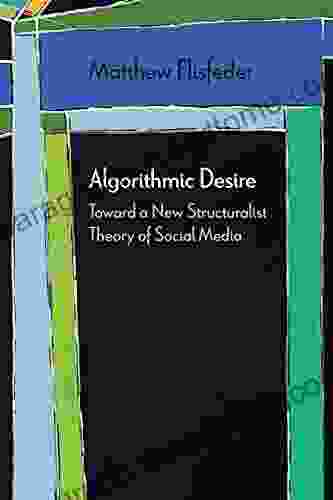Toward a New Structuralist Theory of Social Media Diaeresis

Abstract
This book presents a new structuralist theory of social media diaeresis, which analyzes the ways in which social media platforms divide users into different groups and how these divisions shape the way people interact with each other online. The book draws on a range of theoretical perspectives, including sociology, communication studies, and computer science, to develop a comprehensive understanding of the social and technical factors that contribute to social media diaeresis. The book also provides a series of case studies that illustrate the ways in which social media platforms have been used to divide users and shape the way they interact with each other.
Social media has become an increasingly important part of our lives. We use it to stay connected with friends and family, to share our thoughts and experiences, and to learn about the world around us. However, social media also has a darker side.
5 out of 5
| Language | : | English |
| File size | : | 797 KB |
| Text-to-Speech | : | Enabled |
| Screen Reader | : | Supported |
| Enhanced typesetting | : | Enabled |
| Word Wise | : | Enabled |
| Print length | : | 248 pages |
Social media platforms are often designed to divide users into different groups. This can be done through algorithms that sort content based on our interests, or through features that allow us to filter out certain types of content. This division can lead to a number of problems, including:
- Echo chambers: Echo chambers are groups of people who share the same beliefs and values. They are often created when people are exposed to only one side of an issue, or when they are surrounded by people who agree with them. Echo chambers can lead to people becoming more polarized in their views, and they can make it difficult to have constructive conversations with people who disagree with us.
- Filter bubbles: Filter bubbles are personalized versions of the internet that are created by algorithms that track our online activity. These algorithms show us content that they think we will like, and they filter out content that they think we will not like. Filter bubbles can lead to us becoming less exposed to different perspectives, and they can make it difficult to learn about new things.
- Social isolation: Social media can also lead to social isolation. When we spend too much time online, we can start to neglect our offline relationships. This can lead to feelings of loneliness and isolation, and it can make it difficult to maintain healthy relationships.
The book "Toward a New Structuralist Theory of Social Media Diaeresis" presents a new way of understanding the problem of social media diaeresis. The book argues that social media platforms are not simply neutral tools that allow us to connect with each other. Rather, they are designed with specific social and political goals in mind. These goals include:
- Control: Social media platforms want to control the flow of information online. They do this by using algorithms to sort content and by giving us the ability to filter out certain types of content. This control allows social media platforms to shape the way we think about the world, and it can make it difficult to challenge the status quo.
- Profit: Social media platforms are businesses, and they need to make money. They do this by selling advertising space. To maximize their profits, social media platforms need to keep us engaged on their platforms for as long as possible. This can lead to them using addictive design features and algorithms that keep us scrolling through their content.
- Division: Social media platforms divide us into different groups. They do this by using algorithms that sort content based on our interests, or by giving us the ability to filter out certain types of content. This division can lead to a number of problems, including echo chambers, filter bubbles, and social isolation.
The book "Toward a New Structuralist Theory of Social Media Diaeresis" argues that we need to understand the social and political goals of social media platforms in Free Download to develop effective strategies for resisting their harmful effects. The book proposes a new structuralist theory of social media diaeresis that can help us to understand the ways in which social media platforms divide us and shape the way we interact with each other online. The book also provides a series of case studies that illustrate the ways in which social media platforms have been used to divide users and shape the way they interact with each other.
The book "Toward a New Structuralist Theory of Social Media Diaeresis" is a timely and important contribution to the debate about the role of social media in our society. The book provides a new way of understanding the problem of social media diaeresis, and it offers a series of concrete proposals for resisting its harmful effects.
References
- boyd, d. (2014). It's complicated: The social lives of networked teens. Yale University Press.
- Pariser, E. (2011). The filter bubble: What the internet is hiding from you. Penguin Books.
- Sunstein, C. R. (2018). #Republic: Divided democracy in the age of social media. Princeton University Press.
5 out of 5
| Language | : | English |
| File size | : | 797 KB |
| Text-to-Speech | : | Enabled |
| Screen Reader | : | Supported |
| Enhanced typesetting | : | Enabled |
| Word Wise | : | Enabled |
| Print length | : | 248 pages |
Do you want to contribute by writing guest posts on this blog?
Please contact us and send us a resume of previous articles that you have written.
 Book
Book Novel
Novel Page
Page Chapter
Chapter Text
Text Story
Story Genre
Genre Reader
Reader Library
Library Paperback
Paperback E-book
E-book Magazine
Magazine Newspaper
Newspaper Paragraph
Paragraph Sentence
Sentence Bookmark
Bookmark Shelf
Shelf Glossary
Glossary Bibliography
Bibliography Foreword
Foreword Preface
Preface Synopsis
Synopsis Annotation
Annotation Footnote
Footnote Manuscript
Manuscript Scroll
Scroll Codex
Codex Tome
Tome Bestseller
Bestseller Classics
Classics Library card
Library card Narrative
Narrative Biography
Biography Autobiography
Autobiography Memoir
Memoir Reference
Reference Encyclopedia
Encyclopedia Joel B Teitelbaum
Joel B Teitelbaum Richard Hall
Richard Hall John B Hudson
John B Hudson Phillip Whitt
Phillip Whitt Jennifer Smith
Jennifer Smith John Kieschnick
John Kieschnick Niki Alling
Niki Alling Jens Kurreck
Jens Kurreck Jeremy Taylor
Jeremy Taylor Jim Cullen
Jim Cullen Jessica Handler
Jessica Handler John Schroeter
John Schroeter Philippa Thomson
Philippa Thomson Joe Pometto
Joe Pometto Jerry Pallotta
Jerry Pallotta Madeline Given Nc
Madeline Given Nc John Brothers
John Brothers Joel Shatzky
Joel Shatzky John Buntin
John Buntin Jennifer M Ossege
Jennifer M Ossege
Light bulbAdvertise smarter! Our strategic ad space ensures maximum exposure. Reserve your spot today!

 Robert BrowningQuaker Astronomer Reflects: A Journey Through the Cosmos and the Inner Self
Robert BrowningQuaker Astronomer Reflects: A Journey Through the Cosmos and the Inner Self Gabriel HayesFollow ·14.5k
Gabriel HayesFollow ·14.5k Daniel KnightFollow ·9.3k
Daniel KnightFollow ·9.3k William FaulknerFollow ·9.9k
William FaulknerFollow ·9.9k Colton CarterFollow ·19.9k
Colton CarterFollow ·19.9k Will WardFollow ·7.2k
Will WardFollow ·7.2k Hugh ReedFollow ·14.5k
Hugh ReedFollow ·14.5k Fernando BellFollow ·8.2k
Fernando BellFollow ·8.2k Jordan BlairFollow ·12.1k
Jordan BlairFollow ·12.1k

 Julio Cortázar
Julio CortázarAn Illustrated Encyclopedia Of Live Concerts And...
Immerse yourself in the...

 Edgar Cox
Edgar CoxNon Physically Assaultive Attachment Based Chronic Covert...
What is Covert...

 Robert Reed
Robert ReedThe Baseball of Why: Unraveling the Intricacies of...
Step up to the plate and...

 Aldous Huxley
Aldous HuxleyTacos and Beer: An Atmosphere of Flavorful Delights
In the realm of culinary adventures,...

 Stan Ward
Stan WardUnlock the Secrets of the Aramaic Jesus: Revelations of a...
Journey Back to the Roots of...

 Vincent Mitchell
Vincent MitchellMillionaire Success Strategies: Your Blueprint for...
Unlock the...
5 out of 5
| Language | : | English |
| File size | : | 797 KB |
| Text-to-Speech | : | Enabled |
| Screen Reader | : | Supported |
| Enhanced typesetting | : | Enabled |
| Word Wise | : | Enabled |
| Print length | : | 248 pages |










